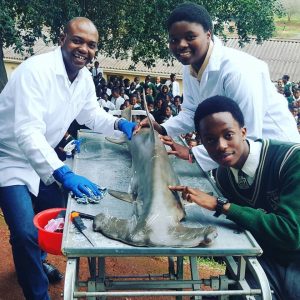 More < than 25 000 pupils in 50 primary and high schools situated in rural KwaZulu-Natal in South Africa will be educated about the devastating effects of pollution in the oceans on marine life through an interactive presentation hosted by Steven Ngubane of Aqua Amazing, sponsorsed by Plastics|SA, Ezemvelo KZN Wildlife and Umgeni Water.
According to Douw Steyn, Sustainability Director at Plastics|SA, this school programme forms part of the annual Clean-Up & Recycle SA activities that take place throughout the month of September. These activities culminate in national Recycling Day on Friday 16 September, and end by celebrating South Africa’s 20th anniversary of participating in the annual International Coastal Clean-Up on Saturday 17 September.
“The ocean remains one of the most expansive, mysterious and diverse places on Earth. Unfortunately, marine life is dying and the whole oceanic ecosystem is threatened by various sources of pollution from people, industry on land and natural causes. If we are to preserve the ocean's integrity and natural beauty, drastic measures will have to be taken to combat this scourge,” Steyn says.
Although many of the children being targeted with this school campaign have never seen the beach, it is important for them to realise that they too have an impact on the health of our oceans. Aqua Amazing therefore teaches children that their land-based litter ends up in rivers, and eventually the oceans, and that they have a responsibility to clean-up and recycle their plastics.
More < than 25 000 pupils in 50 primary and high schools situated in rural KwaZulu-Natal in South Africa will be educated about the devastating effects of pollution in the oceans on marine life through an interactive presentation hosted by Steven Ngubane of Aqua Amazing, sponsorsed by Plastics|SA, Ezemvelo KZN Wildlife and Umgeni Water.
According to Douw Steyn, Sustainability Director at Plastics|SA, this school programme forms part of the annual Clean-Up & Recycle SA activities that take place throughout the month of September. These activities culminate in national Recycling Day on Friday 16 September, and end by celebrating South Africa’s 20th anniversary of participating in the annual International Coastal Clean-Up on Saturday 17 September.
“The ocean remains one of the most expansive, mysterious and diverse places on Earth. Unfortunately, marine life is dying and the whole oceanic ecosystem is threatened by various sources of pollution from people, industry on land and natural causes. If we are to preserve the ocean's integrity and natural beauty, drastic measures will have to be taken to combat this scourge,” Steyn says.
Although many of the children being targeted with this school campaign have never seen the beach, it is important for them to realise that they too have an impact on the health of our oceans. Aqua Amazing therefore teaches children that their land-based litter ends up in rivers, and eventually the oceans, and that they have a responsibility to clean-up and recycle their plastics.
 “Plastic debris is one of the most common elements found in the ocean. This poses a significant threat to marine life as a whole. Our interactive talks and presentations use graphic shark dissections to present the children with amazing facts and figures about the impact of marine litter and waste found in oceans on sharks, marine conservation and marine science matters,” Ngubane says.
“Plastic debris is one of the most common elements found in the ocean. This poses a significant threat to marine life as a whole. Our interactive talks and presentations use graphic shark dissections to present the children with amazing facts and figures about the impact of marine litter and waste found in oceans on sharks, marine conservation and marine science matters,” Ngubane says.
The first leaarners to benefit from the launch of this pilot project were the 900 pupils of Hlahlindlela High School, situated in the hills of Waterfall, KZN. In his talk, Ngubane educated the learners on the various sharks found along our coastline and dispelled many myths about sharks. He also highlighted the importance and many opportunities to be found in waste and recycling.
“Remember that your land-based litter ends up in rivers and ultimately in the oceans where it becomes a potential hazard for living creatures,” he warned. Pupils were also educated about Plastics|SA’s various sustainability initiatives and encouraged to take part in this year’s Clean-up and Recycle Competition.